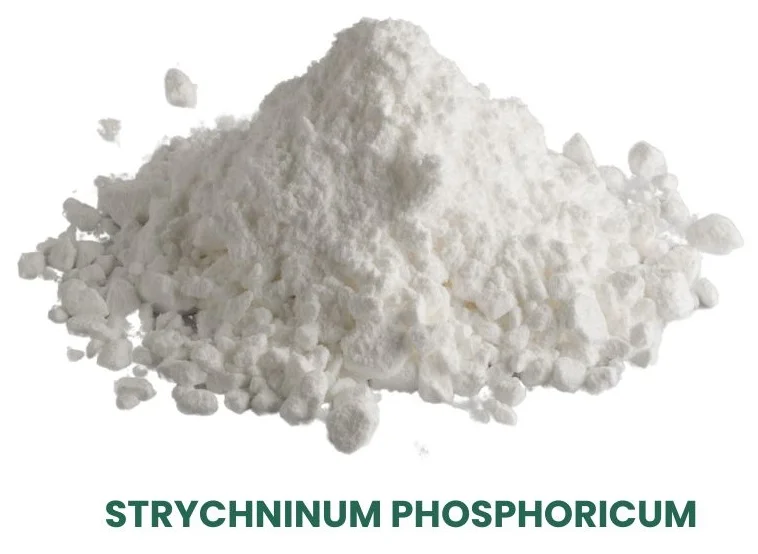Strychninum Phosphoricum, or Phosphate of Strychnine, is a potent homeopathic remedy derived from the combination of strychnine and phosphoric acid.
It is used to treat conditions involving muscle twitching, circulatory irregularities, and mental disturbances.
It is particularly useful in addressing symptoms related to spinal cord issues and early stages of heart muscle degeneration.

SOURCE INFORMATION
Scientific Classification
- Genus: Strychnos
- Species: Strychnos nux-vomica
- Compound: Phosphate of Strychnine
Origin
- Strychnine is extracted from the seeds of the Strychnos nux-vomica tree.
- Phosphoric acid is then added to create the phosphate compound.
Historical Facts
- Strychnine has been historically used as a stimulant and in treating nervous disorders.
- The combination with phosphoric acid enhances its therapeutic properties for conditions related to the nervous and cardiovascular systems.
DRUG PATHOGENESIS
Strychninum Phosphoricum affects the body in the following ways:
- Cerebro-Spinal System: Causes muscle twitching, stiffness, weakness, and loss of power.
- Circulatory System: Leads to irregular pulse, including tachycardia (rapid heart rate) and weak pulse.
- Mental State: Results in a lack of control, uncontrollable desire to laugh, and disinclination to use the brain.
KEY CHARACTERISTICS
- Muscular: Twitching and stiffness in muscles; overall weakness and loss of power.
- Circulatory: Irregular heart rate, including rapid and weak pulse.
- Mental: Uncontrolled laughter and lack of mental focus.
DETAILED ORGAN SYMPTOMS
MUSCULAR SYSTEM
- Twitching and Stiffness: Notable in various muscle groups.
- Weakness: Generalized muscle weakness.
CIRCULATORY SYSTEM
- Irregular Pulse: Includes tachycardia (fast pulse) and weak pulse.
- Heart Conditions: Useful in early stages of heart muscle degeneration and for heart muscle compensation issues.
MENTAL STATE
- Lack of Control: Difficulty controlling emotions and mental focus.
- Uncontrollable Laughter: Frequent bouts of laughter without clear cause.
SPINAL CORD ISSUES
- Anemia of Spinal Cord: Associated with burning, aching, and weakness in the spine.
- Pain in the Chest: Pain extending from the spine to the chest area.
- Cold, Clammy Extremities: Cold feet and clammy perspiration on hands and axillae.
HEART CONDITIONS
- Atelectasis: Partial collapse of the lung.
- Hypertrophied Heart: Early signs of fatty degeneration of heart muscle.
MODALITIES
- Worse: Motion, especially worsening of symptoms with movement.
- Better: Rest and being in open air.
WHAT ARE MODALITIES IN HOMOEOPATHY?
RELATIONSHIP WITH OTHER DRUGS
Compare,
- Cicuta: For tetanus.
- Arnica: For muscle and joint issues.
- Strophanthus: For heart conditions with different action speeds and effects.
- Strychnine-related remedies: Include Strychnin Nit (for alcohol cravings) and Strychnin Sulph (for gastric atony).
DOSE
- Homeopathic: Third trituration.
- General Use: For non-homeopathic use, doses range from one-fiftieth to one-twentieth of a grain, repeated three times a day. For children under twelve, one-fiftieth to one two-hundredth of a grain.
Frequently Asked Questions (FAQs)
What is Strychninum Phosphoricum used for?
- It is used for muscle twitching, circulatory issues, and mental disturbances, particularly in conditions involving spinal cord issues and early heart muscle degeneration.
How is it administered?
- Homeopathically, it is administered in the third trituration.
- Non-homeopathic use involves specific grain doses as mentioned.
What are the common symptoms treated?
- Symptoms include muscle twitching, irregular pulse, lack of control, and spinal issues.
Are there any side effects?
- Possible side effects include exacerbation of symptoms with motion.
- It is generally well-tolerated when used correctly.
Glossary
- Tachycardia: Rapid heart rate.
- Atelectasis: Partial collapse of lung tissue.
- Hypertrophy: Increase in the size of an organ or tissue.
- Anemia: A condition in which there is a deficiency of red blood cells or haemoglobin.
- Trituration: A process of diluting and succussing (shaking) homeopathic substances.
